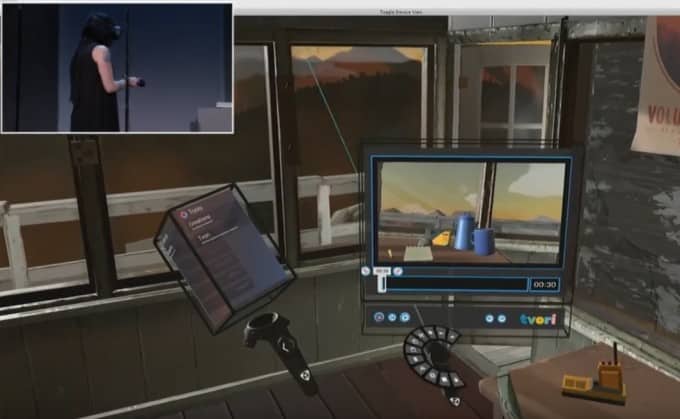Want to create in VR? Without code? Totally nontechnical? If Unity has its way, you’ll be doing that in the next 18-36 months. All you’ll need to do is grab a VR headset and a pair of hand controllers. You’ll select assets and activities as you stand inside a virtual space. It’s like playing around with Tilt Brush. But instead of creating art, you’re creating immersive environments.
All of this surfaced in Unity’s Unite Conference in LA last week. They introduced their VR Editor software earlier this year at the GDC conference but it now has a host of new features. And Unity announced that the software will be open-sourced, incorporating developer contributions. Unity already drives about 70% of the games in the virtual reality market. With the expertise in virtual reality scattered all over the map, they’d like to keep that lead.

Create in VR without code
Unity’s VR Editor platform is not about writing code, but providing users with a set of tools to create content in VR. UploadVR shared parts of an interview with the VP of Unity Labs, Sylvio Drouin.
There is a lot of work that we’re doing right now to have pre-made VR frameworks so you can start and you can just bring your own assets, and you don’t need to code,” Drouin said. “We have entire libraries of behavior.”
He stated that eventually users will be able to “assemble content through Unity pretty much without writing a line of code.” This would be done in VR, though that doesn’t mean you can only create VR experiences; yesterday’s demonstration showed how Editor VR could be extended with additional tools made by other developers to modify scenes in non-VR games like Firewatch.
Here’s the presentation at Unite by Timoni West (Principal Designer) and Amir Ebrahimi (Principal Engineer) showing the improvements in the VR Editor software. It’s still in the early stages of development, so imagine what it will be like in another year as the community contributes tools and assets.
A new era of creativity
Unity’s VR Editor is just a step toward a how we will create in VR in the future. You can see the long term vision in Unity’s Carte Blanche research project. Here, you won’t even need your hand controllers – just gestures and voice commands. Wave your hands, say some words – and build a world.
Unity’s concept video for Carte Blanche was released back in May of this year:
Carte Blanche is probably three years away from release. But it has incredible possibilities. Try to imagine how art, education, entertainment, retail, and other areas will change when immersive environments are brought to life simply through words and gestures. Virtual Reality will no longer be the domain of skilled coders, but the playground of a future Snapchat generation.
Unity’s VR Editor is an impressive piece of software of that will arrive before the end of the year. But powerful as it is, it’s just a stepping stone to the future – a future that will empower our imagination and creativity.
Emory Craig is a writer, speaker, and consultant specializing in virtual reality (VR) and generative AI. With a rich background in art, new media, and higher education, he is a sought-after speaker at international conferences. Emory shares unique insights on innovation and collaborates with universities, nonprofits, businesses, and international organizations to develop transformative initiatives in XR, GenAI, and digital ethics. Passionate about harnessing the potential of cutting-edge technologies, he explores the ethical ramifications of blending the real with the virtual, sparking meaningful conversations about the future of human experience in an increasingly interconnected world.

